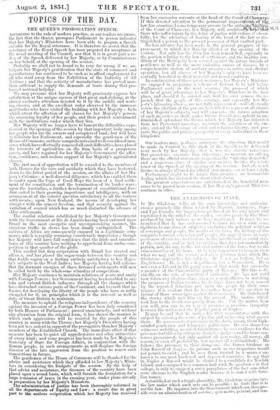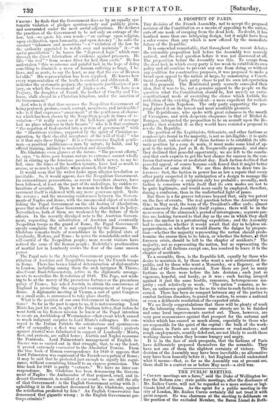THE ANARCHISTS Oh' ITALY.
Ie Mr. Gladstone tells, on his own knowledge and authoLity stories precisely like those related hy Mazzini, Andryane, Pepc, and tigo Foscoln, the impressions produeed on his own mind, and reproduced in the mind of the reader, are also precisely like those produced by such writers as we have mentioned. It must be re- membered that he has endeavoured to limit his view with E.01110 rigidness to one class of subjeets ; excluding the political relation of sovereign and people, the merits of the laws, the history of the compacts between sovereign and people, the appositeness or inap- positeness of existing institutions to the intellectual or social state of the country, and iii fact everything that does not immediately pertain, not, we say, to the internal nature of the laws, but to the administration of the laws. It is very important to keep in view what we may call the remote and alien position from which Mr. Gladstone approaches his subk et. Ile is not an Italian, but an Englishman. He is not a Republican, but a Monarchist. Ire is not even a Liberal in the party sense of that word, but avowedly a member of the Conservative party of Europe. His bias is de- cidedly on the side of constituted authority. Ire has not until now taken any obvious share, even as a sympathizer, in watching the progress of Italian events; his feelings have not been roused by the repeated delusions putt upon the people by their sove- reigns; it is evident that he has rather begged the question in favour of those sovereigns against their aceusers. He disbelieved the stories which met him on his arrival. The motive which took him to the Smith was put ely domestic. Put the matter how you will, you can in no respect presume a previous sympathy between the writer and the Popular party of it aples. It may be said that he makes his first acquaintance with the subject by entering the court of justice and witnessing what passes there. He sees crowds of prisoners in the dock, among them high- minded gentlemen and temperate politicians. He sees shameless witnesses unfolding manifest fabrications', he sees evidence for the prisoners forbidden bystill more shameless judges ; and he hears sen- tences pronounced, not only against all gent: rosity, all mercy, all reason, or even all probability, but against all verisimilitude. Ho follows the prisoners to their dungeons—the James Graham or John Russell of Naples--to prisons such as our inspectors would not permit to exist ; and he secs them treated in a manner un- known to our most hardened and depraved convicts : to say that in Naples a Russell might be chained to a candidate for Norfolk Island, and consigned to a common hall with the graduates in that college, is only to suggest a strict paraphrase of the fact somewhat more obvious to the English reader because it is stated with fami- liar names. fnuous : he finds that the Government does so by an equally sys- tematic violation of pledges spontaneously and publicly given, and asseverated under the most awful adjurations. He declares the practices of the Government to be not only an outrage of the law, but--we quote his own words—" an outrage upon religion, upon civilization, upon humanity, and upon decency "; he calls the conduct "inhuman and monstrous "—a "violation of the law by the authority appointed to watch over and maintain" it—" an awful prostitution ' ; he traces the "depraved logic" which runs through the direct fabrication of evidence against prisoners. He lifts "the veil" " from scenes fitter for hell than earth." He has undertaken "this wearisome and painful task in the hope of doing something to diminish a mass of human suffering as huge, I be- lieve, and as acute, to say the least, as any that the eye of Heaven bel.olds." His representation has been repulsed. Ice knows how every representation of the truth is crushed and obliterated. He indicates the systematic peijurv, the systematic justification of per- jury, on which the Government of Naples rests. "We have seen Perjury, the daughter of Fraud, the mother of Cruelty and Vio- lence, stalk abroad in a Christian kingdom, under the sanction of its Government."
And who is it that thus accuses the Neapolitan Government of being perjured, profane, cruel, corrupt, monstrous, and intolerable ? who is it that expresses " amazement" at the gentleness of charac- ter which has been shown by the Neapolitan people in times of re- volution—" it really seems as if the hell-born spirit of revenge had no place whatever in their breasts" ? who is it that contrasts " the negation of God erected into a system of government" with the "illustrious victims, supported by the spirit of Christian re- signation, by their cheerful acceptance of the will of God ? " who is it that says these things ? It is a Conservative English gentle- man—a practical politician—a man by nature, by habit, and by official training, inclined to moderation and discretion. Mr. Gladstone even glances at the future. "The present efforts," he says, "to drive poor human nature to extremes cannot wholly fail in stirring up the ferocious passions, which never, to my be- lief, since the times of the heathen tyrants, have had so much to arouse, or so much to palliate when aroused, their fury."
It would seem that the writer looks upon ulterior revolution as inevitable. So, it would appear, does the Neapolitan Government. Its extraordinary persecutions, as recent travellers observe, have been followed, at least on the part of its underlings, by sudden re- laxations of severity. There is no reason to believe that the Go- vernment itself is endowed with any more generous spirit. Quite the reverse ; and the unceasing conferences between the Govern- ments of Naples and Rome, with the unconcealed object of reestab- lishing the Papal Government on the old footing of Absolutism, rove that neither of those Governments has abandoned its 'policy. Nevertheless, both of them are weakened by the failure of their officers. In the recently divulged note to the Austrian Govern- ment, requesting the substitution of Austrian and eventually Neapolitan troops as the guard of Rome, the Papal Government openly complains that it is not supported by the Romans. Mr. Gladstone remarks traits of resemblance in the political state of Lombardy, Modena' and Rome ; he notes the remarkable order and self-control of the Neapolitan people; more recent visitors have noticed the same of the Roman people ; Radetzky's proclamation of martial law in Lombardy avows the fear of the same unseen power.
The Papal note to the Austrian Government proposes the sub- stitution of Austrian and Neapolitan troops for the French troops in Rome. There has been a kind of determination of diplomatists to London, including among them the arch intriguer M. Thiers ; also Count Buol-Schauenstein, active in the diplomatic arrange- ments to neutralize the Revolution of 1848. The Pope, not wfsh- ing to be at the mercy of the precarious fortunes or the precarious policy of France, has asked Austria to obtain the concurrence of England in promoting the suggested rearrangement of troops at Rome. A diplomatic meeting at Vienna, a sort of quiet Congress on a small scale, is announced to take place shortly.
What is the position of our own Government in these complica- tions? So far as the past is open to us, it is notreassuring. Lord Mint° has just let out, in spite of the Durham letter, that before he went forth on his Roman mission he knew of the Papal intention to create an Archbishop of Westminster—that event which caused so much indignant surprise to Lord Minto's colleagues. He con- veyed to the Italian Patriots the ostentatious and spontaneous offer of sympathy ; a fleet was sent to support Sicily' protests against Austria were fulminated in support of Lombardy : Minto, fleet, and, protests, are called home ; Austria and Naples reassume the Peninsula. Lord Palmerston's management of English in- fluence was so carried out in that struggle, that, to say the least, it proved extremely conrenient to the Absolutist Powers. From the blue book of Roman correspondence for 1849 it appears that Lord Palmerston was cognizant of the French occu pation of Rome; it may be said that he protested just enough to signify his cogni- zance, without committing himself to an express permission. The blue book for 1849 is partly "extracts." We have no later cor- respondence. Mr. Gladstone has been denouncing the Govern- ment of Naples : the Ambassador of that perjured, cruel, and in- decent Government, is resident at our court; we are still the ally of that.Government : is the English Government acting with it— upholding it in the conduct denounced by Mr. Gladstone, against the retribution predicted by him ? An English Conservative has denounced that gigantic wrong : is the English Government par- ticeps criminis ?



























 Previous page
Previous page